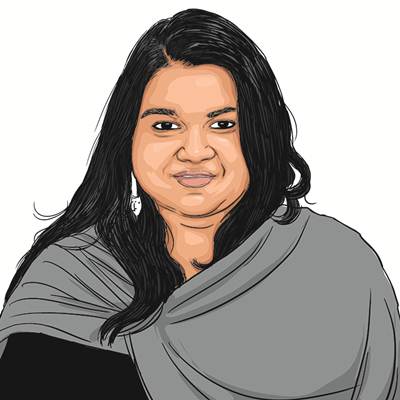Opinion Don’t invoke Babasaheb Ambedkar selectively
The sheer number of ideas and the vision Ambedkar left behind is not just useful for Dalits but also for the nation. Selective acceptance of his principles and disproportionate representation of matters concerning marginalised groups dilutes his mission statement.
 In Parliament, there is a battle over B R Ambedkar’s legacy. Is this just about the current moment in politics or does it represent an unease with his progressive legacy?
In Parliament, there is a battle over B R Ambedkar’s legacy. Is this just about the current moment in politics or does it represent an unease with his progressive legacy? Jawaharlal Nehru wrote: “Reservation… will promote inefficiency and mediocracy.” I often wonder if this was a reason for denying B R Ambedkar a dignified space in the corridors of power. Did the Congress think so little of us, the Dalits? Did Ambedkar resign because he felt neglected or because he became the voice of Dalits and women?
Usually, I would abstain from airing my views on political controversies, which will neither further the cause of the marginalised nor lead to a constructive conversation. However, the ongoing mudslinging in Parliament is a case of the pot calling the kettle black. Politicians, mostly from dominant castes, are fighting over the legacy of Babasaheb Bhimrao Ambedkar. They have done little to weed out caste-based discrimination that is so pervasive in the system that it has become a system in itself. We still hear of a man being urinating upon simply because he is a Dalit. In this day and age, this defies all logic.
The present controversy is an insult to our collective intelligence. The intensity with which the INDIA bloc has raised this belies the fact that people in power still do not understand the real issues of Dalits or other marginalised groups. Let it be made clear that we Dalits are not fighting for identity. There is no identity crisis for us. From Babasaheb to Babuji (Jagjivan Ram), from Karpoori Thakur to Kanshi Ram, from Mayawati to Ram Vilas Paswan, our cause stands on the shoulders of giants who do not need any introduction. The fight is for our dignity and recognition, opportunity, and equality.
It was wrapped in appeasement politics for the last several decades and sprinkled with dole-outs. The downside of appeasement politics is that it is meant to keep the concerned demographic at marginal deprivation, ensuring that their demands are met but their hopes and aspirations crushed. Despite budget allocations, political relevance and vote-bank politics, dismal efforts in basic amenities like education, health and employment have ensured that the biggest minority in India is facing the same issues that they did 50-60 years ago.
The oldest political party in India did everything it could to stay in power, toying with soft Hindutva, nationalism and minority appeasement. The Dalits and OBCs of this country grew without the explicit support of the dominant party for the greater part after our Independence. From initial roadblocks to reservation in the Constituent Assembly to resistance towards Mandal Commission recommendations — the Congress has done everything possible to dilute the affirmative action put in place by Babasaheb. One can only imagine the plight of Dalits had Ambedkar not been the head of the drafting committee.
In the initial decades after Independence, ruled by the Congress and driven heavily by ideas and ideals of the Left, especially the Communist binary of rich and poor, the Congress did not see beyond class. Historically, the biggest vote bank of the Congress had been the Dalits, but the party saw them from a narrow view of class instead of understanding the realities of caste. For the Congress, it was not Dalits who voted for it, but the gareeb janta (poor people). Gareebi (poverty) was the mainstay of Indian politics and Dalits formed the largest chunk of it. The social experiment based on an ideological approach led to the invisibilisation of the community. This went on for the most part of our modern independent political history. The rise of socialist movements and caste-based state parties and leaders gave impetus to Dalit rights, issues and aspirations.
Babasaheb Ambedkar is like god to us and reservation is like oxygen for us. The sheer number of ideas and the vision Ambedkar left behind is not just useful for Dalits but also for the nation, to look beyond the vagaries of discrimination. In the last decade or so, Prime Minister Narendra Modi’s efforts in mobilising GYAN (gareeb, yuva, annadata, nari) and giving dignity and respect to the Dalit discourse has been unprecedented. From introducing the Nari Shakti Vandan Adhiniyam, 2023, and Uniform Civil Code in Uttarakhand to the creation of panch teerth sites, the current regime has actualised the dreams and aspirations of Dalits. The level of participation of Dalit leaders and politicians in a national party like the BJP has been unparalleled.
Ambedkar is not just for the Dalits but for anyone who is marginalised. We have moved on from ourfight for identity and existence. We know that no party can ignore us now whether in power or in opposition. Our fight is for aspiration, equal opportunity and equity in ideation, administration, and governance.
It does not matter whether you call him Ambedkar or Babasaheb, whether you take his name once or chant it every day — if you want to venerate Babasaheb, give credence to his idea of the nation.
The writer is assistant professor of Sociology, Lakshmibai College, Delhi University




